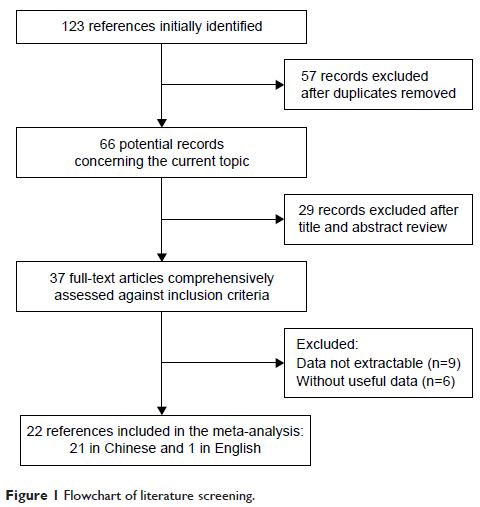109568
论文已发表
注册即可获取德孚的最新动态
IF 收录期刊
- 3.4 Breast Cancer (Dove Med Press)
- 3.2 Clin Epidemiol
- 2.6 Cancer Manag Res
- 2.9 Infect Drug Resist
- 3.7 Clin Interv Aging
- 5.1 Drug Des Dev Ther
- 3.1 Int J Chronic Obstr
- 6.6 Int J Nanomed
- 2.6 Int J Women's Health
- 2.9 Neuropsych Dis Treat
- 2.8 OncoTargets Ther
- 2.0 Patient Prefer Adher
- 2.2 Ther Clin Risk Manag
- 2.5 J Pain Res
- 3.0 Diabet Metab Synd Ob
- 3.2 Psychol Res Behav Ma
- 3.4 Nat Sci Sleep
- 1.8 Pharmgenomics Pers Med
- 2.0 Risk Manag Healthc Policy
- 4.1 J Inflamm Res
- 2.0 Int J Gen Med
- 3.4 J Hepatocell Carcinoma
- 3.0 J Asthma Allergy
- 2.2 Clin Cosmet Investig Dermatol
- 2.4 J Multidiscip Healthc

中国人群中颈动脉粥样硬化和复发性脑梗死的关联:一项综合分析
Authors Liu J, Zhu Y, Wu Y, Liu Y, Teng Z, Hao Y
Received 11 October 2016
Accepted for publication 25 November 2016
Published 20 February 2017 Volume 2017:13 Pages 527—533
DOI https://doi.org/10.2147/NDT.S124386
Checked for plagiarism Yes
Review by Single-blind
Peer reviewers approved by Dr Chin-Pang Lee
Peer reviewer comments 2
Editor who approved publication: Professor Wai Kwong Tang
Abstract: Stroke, when poor blood flow to the brain results in cell death, is the
third leading cause of disability and mortality worldwide, and appears as an
unequal distribution in the global population. The cumulative risk of
recurrence varies greatly up to 10 years after the first stroke. Carotid atherosclerosis
is a major risk factor for stroke. The aim of this study was to investigate and
estimate the relationship between carotid atherosclerosis and risk of stroke
recurrence in the Chinese population. We performed a systematic review and
meta-analysis of randomized controlled trials published from 2000 to 2013,
using the following databases: PubMed, Embase, Medline, Wanfang, and the China
National Knowledge Infrastructure. The odds ratios with 95% confidence
intervals were calculated to examine this strength. A total of 22 studies,
including 3,912 patients, 2,506 first-ever cases, and 1,406 recurrent cases,
were pooled in this meta-analysis. Our results showed that the frequency of
carotid atherosclerosis is higher in recurrent cases than that in the first-ever
controls (78.88% vs 59.38%), and the statistical analysis demonstrated
significant positive association between carotid atherosclerosis and recurrent
cerebral infarction (odds ratio: 2.87; 95% confidence interval: 2.42–3.37; P <0.00001) in a fixed-effect
model. No significant heterogeneity was observed across all studies. In
conclusion, our results showed that carotid atherosclerosis was associated with
increased risk of recurrent stroke. However, further well-designed research
with large sample sizes is still needed to identify the clear mechanism.
Keywords: cerebral infarction, carotid
atherosclerosis, meta-analysis
